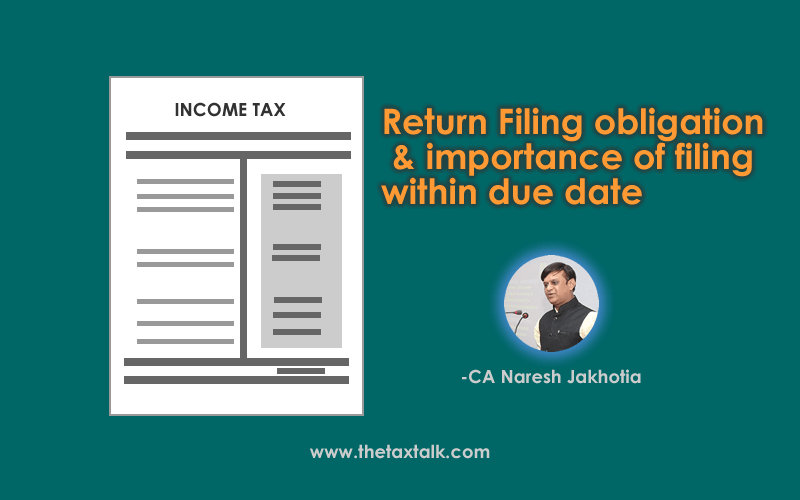![]()
Return Filing obligation & importance of filing within due date
‘Timely compliance’ is the need of the hour as far as the provision of Income Tax Act-1961 is concerned. Delay or late filing has its own cost & consequences, not only in terms of monetary penalty & fine but also in terms of denial of various benefit & incentives.
Under the Income Tax Act-1961, every person whose income exceeds the basic exemption limit is required to file the Income Tax Return (ITR) mandatorily. It may be noted that the obligation to file the return of income is linked with income & not with tax. Even if the tax is fully paid or even if the Tax Deduction at Source (TDS) amount is more than the final tax liability of the taxpayer, still such person will be required to file the return of income. There are many salaried taxpayers who are not filing their ITR on the pretext that the TDS is done by their employer & it absolves them from their liability to file the ITR. This is not so. Be cautious about the legal provision & file the ITR even if no more tax is payable at the time of filing.
Further, the liability to file the ITR arises if the income ‘before claiming deduction under Chapter VIA (which includes deduction u/s 80C towards LIC/PPF/NSC/ELSS etc, U/s 80D towards mediclaim payment, U/s 80CCD(1B) towards National Pension Scheme (NPS) etc)’ exceeds the basic exemption limit. That is, if the final taxable income is above basic exemption limit & after claiming deduction U/S 80C, 80D, it goes reduces to amount which is below basic exemption limit then still taxpayer would be required to file ITR. Similarly, Exemption available u/s 10(38) towards Long Term Capital Gain (LTCG) arising from sale of shares is also to be ignored & if amount exceeds basic exemption limit prior to such exemption then ITR filing is mandatory.
Any person having any beneficial ownership or any assets or signing authority in any account located outside India are mandatorily required to file ITR even if there is no income or income is below the basic exemption limit.
It is very pertinent to mention here that the partnership firm & company are required to file the ITR even if no income is there or no business activity is carried out by it. Section 139(1) imposes a compulsory liability to file the return of income for firms & companies. Even if the firm or company is incorporated on the last day of the financial year, the liability to file the return affixes. Earlier, taxpayers were conferred with 2 year time frame to file the return of income which is restricted to one year only.
There are multiple disadvantages if the return of income is not filed within due date, as under:
- If the return is not filed within due date then late fee (& it is not termed as Penalty) would leviable. For taxpayer with income up to Rs. 5 Lakh, Late fee would be Rs. 1,000/-. For taxpayer with income exceeding Rs. 5 Lakh, Late fee would Rs. 5000/- if return is filed by 31st December & Rs. 10,000/- if return is field after 31st December.
Questions are raised by lot many taxpayers regarding the applicability of late fee if the taxpayers with income (ignoring Chapter VIA deduction, 10(38) exemption etc) below the basic exemption limit files return of income after due date. It may be noted that the late fee is applicable only if there is obligation to file the return of income u/s 139(1). Returns filed voluntarily without any obligations attached u/s 139(1) would not be subject to any late fee. At the cost of repetition, firms/companies without any income/business would be liable for late fee if ITR is not filed within due date as the obligation is imposed by section 139(1).
- If taxpayers incur any loss during the year, there is a benefit to carry forward such loss for set off in subsequent years. However, this benefit of carry forward of loss is available only if ITR is filed within due date. If the ITR is filed after the due date then the benefit to carry forward the loss stands cancelled.
- The taxpayers who are required to carry out the tax audit (u/s 44AB) of their books of accounts are also required to file ITR & submit audit report within due date to avoid above penal consequences. If such taxpayer fails to file the audit report within due date then they would be liable to penalty @ ½% of the turnover. However, maximum amount of penalty in such cases is restricted to Rs. 1.50 Lakh.
- Earlier, there was a provision whereby facility to rectify errors & omissions in ITR by filing revised return was available only if the ITR is filed within due date & return filed belated were denied the option to rectify the errors & omissions by filing revised return. However, by the Finance Act-2016, returns filed belatedly have been bestowed with the rights to rectify the errors & omission in original returns by filing revised return.
- There are deductions u/s 80IA, IB, IC etc which are admissible only if the return of income is filed within due date. Belated filing of return results in denial of such deductions. The scope is now further stretched by the FA – 2018 w.e.f. 1.4.18 whereby deductions from section 80HH to sections 80RRB will not be available if the return is filed after the due date. In short, tax benefit is available not to those who merely comply with the law but who comply it in a timely manner.
[Readers may forward their feedback & queries at taxtalknew@gmail.com. Other articles & response to queries are available at www.theTAXtalk.com ]


